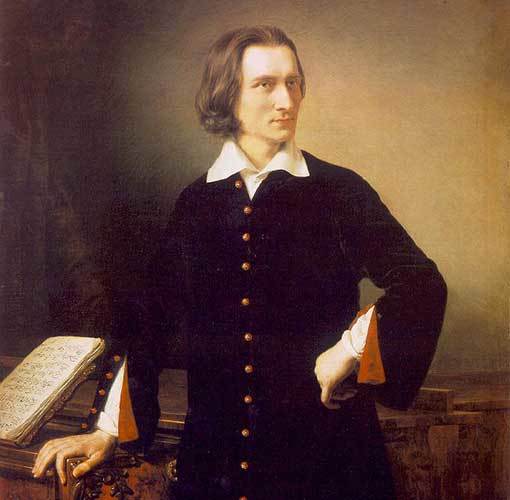Franz Liszt has been almost forgotten in the Czech Republic as a composer. One is more likely to think of him sometimes as a supporter of Bedřich Smetana. However, philanthropy belonged to Liszt's life as much as music and one of his charity concerts took place in Brno.
Mozart's all-embracing cult did not miss the city of Brno, the city even has the Mozart Hall. It is in Reduta, where the 11-year-old virtuoso performed in 1767, when he and his father and sister were running away from Vienna from an epidemic of smallpox. However, Mozart was not the only famous composer, who stopped by in Brno. Others did it too and they were not necessarily fleeing from a deadly disease. However, worshipping the Mozart sun somehow overshadowed all other famous visitors, whose presence is not commemorated. Today, i.e. on Thursday, 24 March 2016, it has been 170 years since Franz Liszt performed in Reduta. He was on top of his piano career and the concert proceeds were donated to the Elizabethan monastery at today's Kamenná.
It is a pity that Liszt's cult has been perfectly passing by Reduta and the whole Brno, while some work is occasionally done on artificially feeding the cult of Mozart. A hall is name after him here, a statue is built there, Vladimír Morávek directs a series of performances, which also includes an opera by Miloš Štědroň. I have nothing against Mozart, but everything against his cult. Actually, it is quite hard to understand why Brno is trying to feed off of him. An ordinary concert was played here that did not mean anything for the city and the life in it. It is, of course, not necessary to lie to ourselves believing that the Brno concert could be something important for Liszt's career. But the demonically attractive virtuoso of his time came here based on his own decision and in addition he helped the monastery which is still serving the city today. It would therefore be worth it to remember Franz Liszt (22 October 1811 - 31 June 1886), although the image of his music is not so sunny.
Franz Liszt posts on Instagram➚
According to witnesses of the times, he was a brilliant pianist, a concert star that was bringing weaker characters to their knees. He also belongs to the Holy Trinity of Neo-Romantic composers along with Hector Berlioz and Richard Wagner. But he was the only one who really knew how to brilliantly play an instrument. His concert career secured a decent living for him and he still had enough for generous donations. Both his Neo-Romantic colleagues recognised it and neither of them forgot his support. Moreover, Wagner married Liszt's daughter Cosima, even though the circumstances, under which he lured here away from her first husband, were quite disgusting. The two friends had a falling out for some time. More importantly, Wagner also largely married Liszt's music. Many harmonious discharges, which still vibrate ears and soul in Tristan and Isolde today, come from Liszt's symphonic poems.
When Hector Berlioz travelled the world with his music, he also visited Prague where he met Liszt. At a banquet after the concert, he was asked to do a toast, in which Berlioz said in his funny and unreliable memoirs: "His words were warm, sentences intellectually rich and expression so great that many speakers could envy him; I was deeply moved. Unfortunately, he was as good at speaking as at drinking; such streams of champagne poured out of the gifted cup that his eloquence drowned in them. Liszt's secretary Belloni and I were still in the streets of Prague at two o'clock trying to make him change his mind and not wait until daylight and not to fight with a Czech at a distance of two steps just because he drank better than he did. When the day came, we were worried about Liszt, because he had a concert at noon. He was still sleeping at half past eleven. Finally, we woke him up, he entered the car, entered the hall, where the audience greeted him with a triple salvo of applause, and he played, I think, like never before in his life. They, the pianists, have their god..."
Franz Liszt was a star as they come – from success, to crowds of fans and wild life. Unlike others, he ended his concert career at the absolute top, he played his last concert for a fee in September 1847. He was 35 years old, so he managed to play concerts three years longer than Glenn Gould. He focused on composing, conducting and teaching. In 1857, he joined the Third Monastic Order of St. Francis of Assisi, and he lived a lonely life after the death of his son Daniel (1859) and daughter Blandine (1862). Later, he lived alternately in Weimar, Rome and Budapest. He died in 1886 during the Bayreuth Festival, he survived his son-in-law Richard Wagner by three years.
Liszt's presence in Brno is now forgotten and is not commemorated. Maybe it is generally associated with the fact that the whole great Romantic pathos led by Liszt seems somewhat exaggerated and weird today. Perhaps it is just waiting for a more opportune time that encounters it as its historical parallel. Then, even Liszt could settle down in Reduta as a happy neighbour to Mozart. Perhaps along the sounds of one of his piano variations on the theme of operas of his younger colleague.































